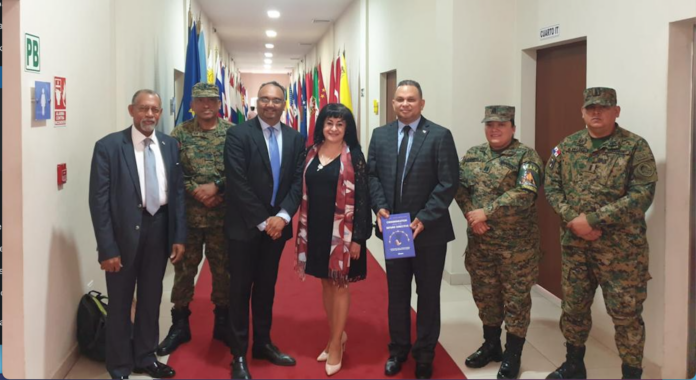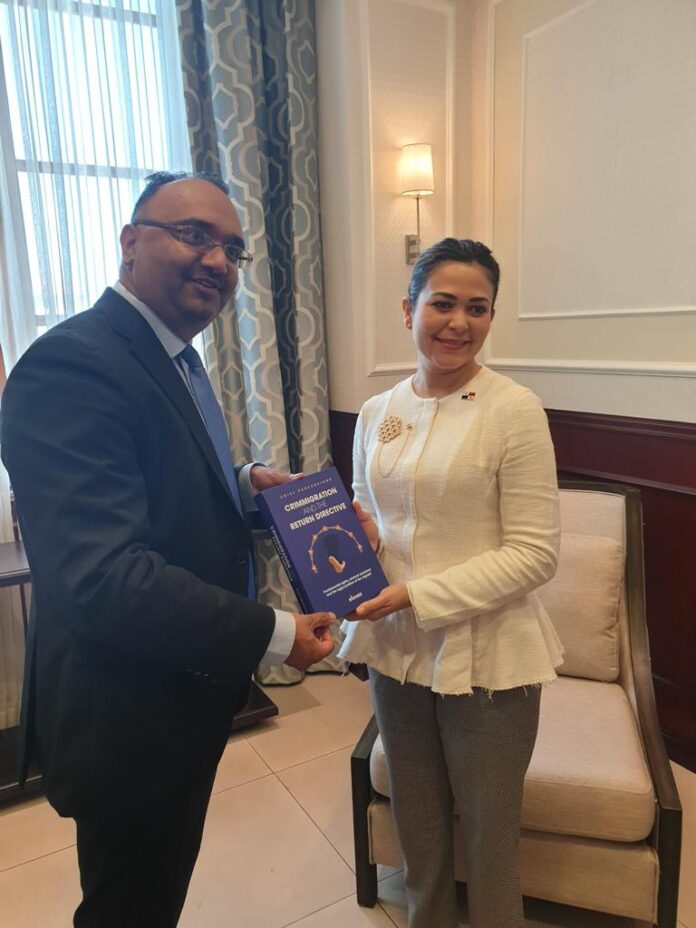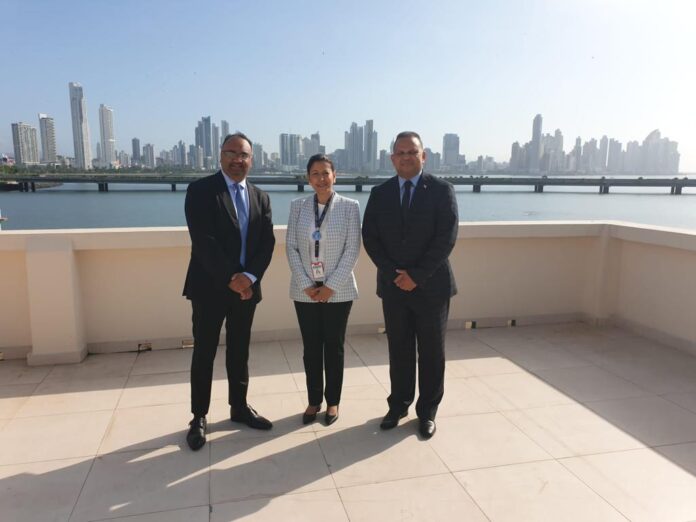During a courtesy visit in January 2023 to the Panama Embassy in The Netherlands, the distinguished legal scholar and deputy judge, Mr. Aniel Pahladsingh, met with the ambassador, HE Ms. Elizabeth Ward Neiman. It was his casual comment of an upcoming trip to South America which prompted the mention of Panama being the hub of the Americas and the 10-day Panama stopover incentive. Additionally, Ambassador Ward gave insight as to the emigration challenges that Panama was facing and the benefit of shared knowledge. Interest was sparked and Ambassador Ward immediately proceeded with contacting universities and the Ministry of Foreign Affairs to organize conferences.
In July 2023, Mr. Pahladsingh embarked on a notable journey to Panama. His visit to this Central American nation was a mission to shed light on one of the most pressing issues of our time – migration flows on the American continent. During his visit, Mr. Pahladsingh delivered lectures at USMA University and the Ministry of Foreign Affairs while engaging in meaningful discussions with various government officials involved in migration management in Panama.

During these enlightening lectures and conversations, several crucial topics were brought to the forefront:
Lessons from the Influx in Europe: Problems, Solutions, and Challenges
Drawing from his vast expertise, Mr. Pahladsingh delved into the lessons that could be learned from Europe’s experience with migration. He discussed the problems, solutions, and challenges faced by European nations in dealing with large-scale migration, providing valuable insights for Panama.
Legal Solutions for the State of Panama
In his lectures, Mr. Pahladsingh explored legal avenues and solutions tailored to Panama’s unique circumstances. These solutions aimed to provide a legal framework for managing migration effectively and in accordance with international norms.

Practical Solutions for the State of Panama
Practicality is essential in addressing the complex issue of migration. Mr. Pahladsingh shared his insights on practical solutions that complement those that Panama has already implemented to ensure the well-being of migrants and its own citizens.
Exchange of Experiences
Mr. Pahladsingh facilitated a valuable exchange of experiences between Panama and other countries dealing with similar migration challenges. This sharing of knowledge is crucial for devising informed policies and strategies.
One of the most striking observations made by Mr. Pahladsingh was that Panama most often serves as a transit country for migrants with aspirations of reaching North America. However, many of these migrants do not make it past the intensive border controls imposed by the United States, leading them to return through Panama.
“Through conversations with Ambassador Ward and media reports it was clear that Panama serves as a transit country for various migrants who ultimately want to reach North America. However, many migrants do not reach North America due to intensive US border controls and therefore return back through Panama.”
Various migration flows from countries such as Venezuela, Colombia, Cuba, Haiti, and Ecuador were noted, each driven by a mix of political, economic, safety, rule of law, and environmental reasons. What’s more, there has been a noticeable shift in migration patterns from Africa and Asia towards Latin America, as strict migration rules in Europe and North America prompt migrants to explore alternative routes.

In light of these observations, Mr. Pahladsingh emphasized the importance of regional cooperation among Latin American countries, including Panama. Sharing information and collaborating on migration flows can lead to a more balanced and effective approach to migration management.
“Panama has faced a lot of new migrants. Panama is hospitable in receiving migrants. However, the increase in the number of migrants has had an effect on the reception capacity and procedures.”
The sheer scale of migration through Panama is staggering. In 2019, an estimated 24,000 migrants passed through Panama. By August 2023, this number had skyrocketed to 340,000, with an expected 400,000 by year-end. While Panama has demonstrated hospitality in receiving migrants, this influx has stretched the country’s reception capacity and procedures.
The economic impact of excessive migration flows on Panama cannot be underestimated. Moreover, the perilous journey many migrants undertake through the inhospitable Darien forest, a national reserve inhabited by indigenous people, has led to significant environmental degradation. This includes damage to flora and fauna, a consequence that demands urgent attention.
“Despite all the efforts Panama is already doing, in my opinion there are several solutions in order to regulate the migration flows in the region to create a more effective migration management. There should be more cooperation on migration flows from other countries in the region as well as the USA (country of destination). Accurate and reliable figures are necessary to implement a good migration policy. Furthermore, although Panama has dedicated over 65 million US dollars in direct assistance to migrants, with the economic assistance of other countries additional investments can be made in order to create a more effective asylum and immigration procedure. Another solution is to realize readmission agreements with the countries where the migrants come from to create the incentive of deportation.”
Tragically, the journey for migrants through this forest also exposes them to grave dangers, such as human smuggling and, in some cases, sexual exploitation. It is organized crime groups that primarily benefit from these tragic situations.
In light of these challenges, Mr. Pahladsingh suggested a series of solutions to regulate migration flows more effectively in the region:
Enhanced Cooperation on Migration Flows
Regional collaboration is paramount. Countries in Latin America, as well as the United States as the destination country, should work together to establish coherent migration policies and share accurate data.
Increased Financial Investment
Panama’s commitment to dedicating $65 million in direct assistance to migrants is commendable. However, with additional economic support from other countries, more can be done to improve asylum and immigration procedures.
Readmission Agreements
Creating incentives for deportation through readmission agreements with countries of migrant origin can help regulate migration flows.
International Cooperation and Investment
To address the root causes of migration, international cooperation and investments are necessary to improve political and economic conditions in the countries from which these migration flows originate.
Deputy Judge Aniel Pahladsingh’s visit to Panama was more than just a diplomatic exchange; it was a call to action. His extensive knowledge and insights on migration law have provided Panama and the broader international community with a roadmap to address the complexities of migration flows on the American continent. As we navigate the challenges of our ever-changing world, it is leaders like Mr. Pahladsingh who offer hope and practical solutions for a better future.



